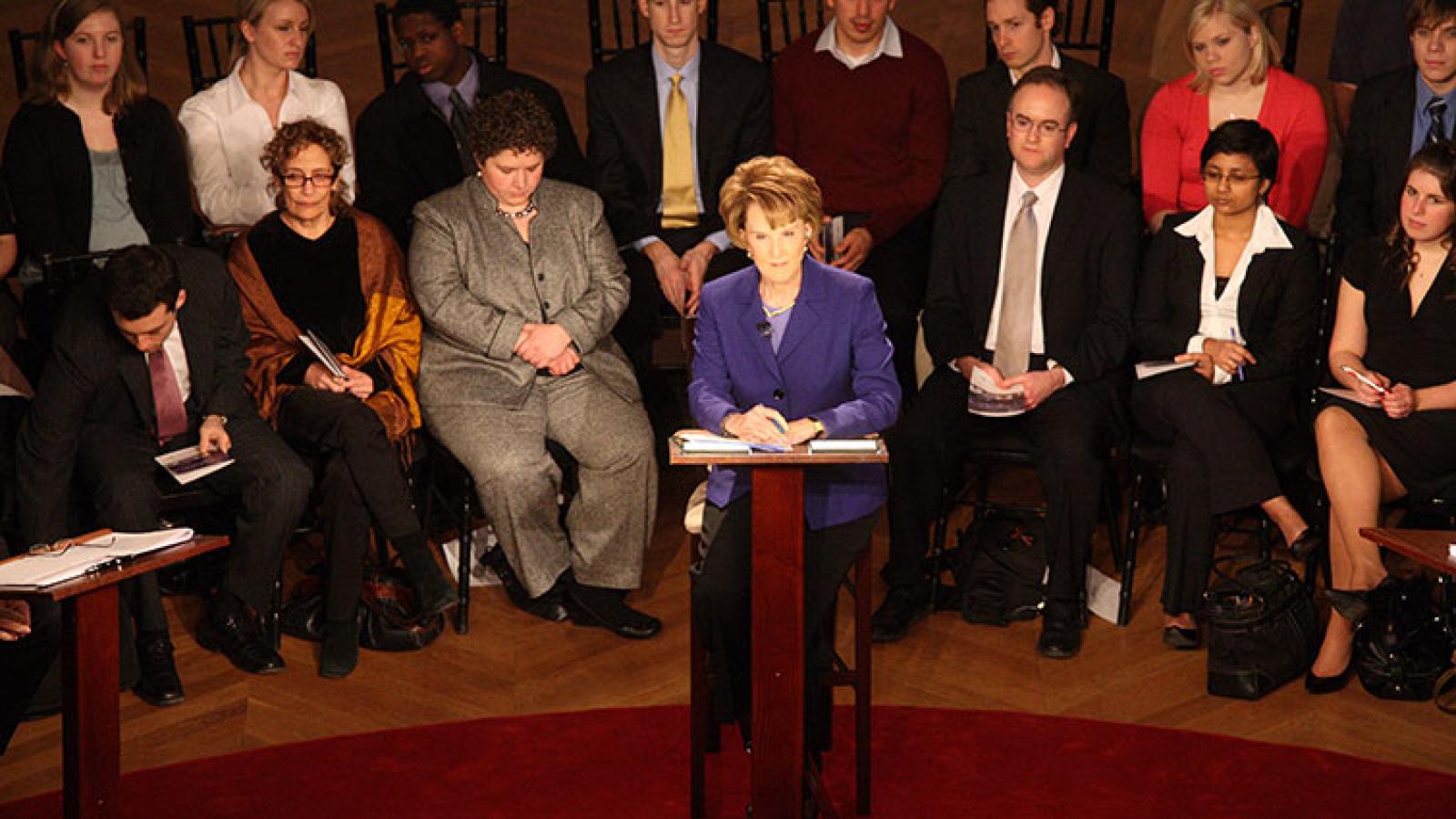Curbing Iran's Nuclear Ambitions: National Discussion and Debate Series
Nearly two decades after the end of the Cold War, the U.S. remains atop a unipolar international order. However, the paradigm is shifting rapidly as global issues (climate change, nuclear proliferation, famine and disease) take on increased importance, and as China, India, Russia, and the European Union become more assertive in international affairs. With the U.S. on the precipice of a long recession and mired in an unpopular war, America's position of global leadership may continue its decline in the coming years. But who should be more concerned with America's decline – America herself or the international community?
Resolved: America cannot tolerate a nuclear Iran and must go to any lengths to prevent it
Arguing for the resolution:
Elliott Abrams is Senior Fellow at the Council on Foreign Relations in Washington, D.C. He held many positions in President George W. Bush's Administration – most recently as Deputy Assistant to the President and Deputy National Security Advisor for Global Democracy Strategy (2005–09), supervising both Near East and North African Affairs, and the National Security Council's Democracy, Human Rights, and International Organizations directorates. As Special Assistant to the President, he also served as Senior Director of the NSC for Near East and North African Affairs (2002–05), and as Senior Director of the NSC for Democracy, Human Rights, and International Organizations (2001–02). He was president of the Ethics and Public Policy Center in Washington, D.C. (1996–2001) and served for eight years in President Reagan's State Department.
Joshua Muravchik is a Fellow at the Foreign Policy Institute of the Johns Hopkins University's Paul H. Nitze School of Advanced International Studies, and is an adjunct scholar at the Washington Institute for Near East Policy and an adjunct professor at the Institute of World Politics. He served on the State Department's Advisory Committee on Democracy Promotion, and has served as a Resident Scholar at the American Enterprise Institute (1987–2008) and a Fellow in Residence at the Washington Institute for Near East Policy. Mr. Muravchik ran the Coalition for a Democratic Majority, and was an aide to Rep. James G. O'Hara (D-Mich.), Sen. Daniel Patrick Moynihan (D-N.Y.), and Sen. Henry M. Jackson (D-Wash.). He serves on the board of trustees of Freedom House, and on the editorial boards of World Affairs, the Journal of International Security Affairs, and the Journal of Democracy.
Arguing against the resolution:
Martin S. Indyk is Director of the Brookings Institution's Saban Center for Middle East Policy and Senior Fellow in Brookings' Foreign Policy Studies Program. He served two tours as U.S. Ambassador to Israel (1995–97, and 2000–01), and was Special Assistant to President Clinton, the NSC's Senior Director of Near East and South Asian Affairs, and Assistant Secretary of State for Near East Affairs. Ambassador Indyk was the founding Executive Director of the Washington Institute for Near East Policy, and has taught at the Johns Hopkins School of Advanced International Studies; the Middle East Institute at Columbia University; the Dayan Center for Middle East Studies at Tel Aviv University; and the Department of Politics at Macquarie University in Sydney, Australia. He is a member of the Council on Foreign Relations and the American Academy of Diplomacy.
Karim Sadjadpour is an associate at the Carnegie Endowment for International Peace. A leading researcher on Iran, he spent four years as the chief Iran analyst at the International Crisis Group based in Tehran and Washington, D.C., and has conducted interviews with senior Iranian officials, intellectuals, clerics, dissidents, paramilitaries, businessmen, students, activists, and youth. He is a regular contributor to BBC World TV and radio, CNN, National Public Radio, and PBS's The NewsHour, and has written for publications including The Economist, the Washington Post, and the New York Times. Sadjadpour was named a Young Global Leader by the World Economic Forum in Davos, and is a board member of the Banu Foundation, which assists grassroots organizations empowering women worldwide. He holds degrees from the University of Michigan and the Johns Hopkins School of Advanced International Studies.
Moderator:
Margaret Warner is one of five senior correspondents on The NewsHour with Jim Lehrer. She is the lead correspondent for "The NewsHour's" overseas reporting unit, which has taken her recently to Iran, Turkey, France, Pakistan, Kenya and China. She is also one of four co-anchors of America Abroad, an hour-long radio program devoted to foreign affairs, airing on 90 public radio stations through Public Radio International. In 2008, Ms. Warner won a coveted Emmy award for her extensive coverage of political turmoil in Pakistan. That same year, she also was awarded the Edward Weintal Prize for International Reporting by Georgetown University's Institute for the Study of Diplomacy for her overseas reporting. Ms. Warner joined The NewsHour in 1993 after an award-winning career in print journalism including ten years at Newsweek, during which she served as a political and campaign correspondent, White House reporter, and chief diplomatic correspondent during the end of the Cold War, the collapse of the Soviet Union and the first Gulf War.
